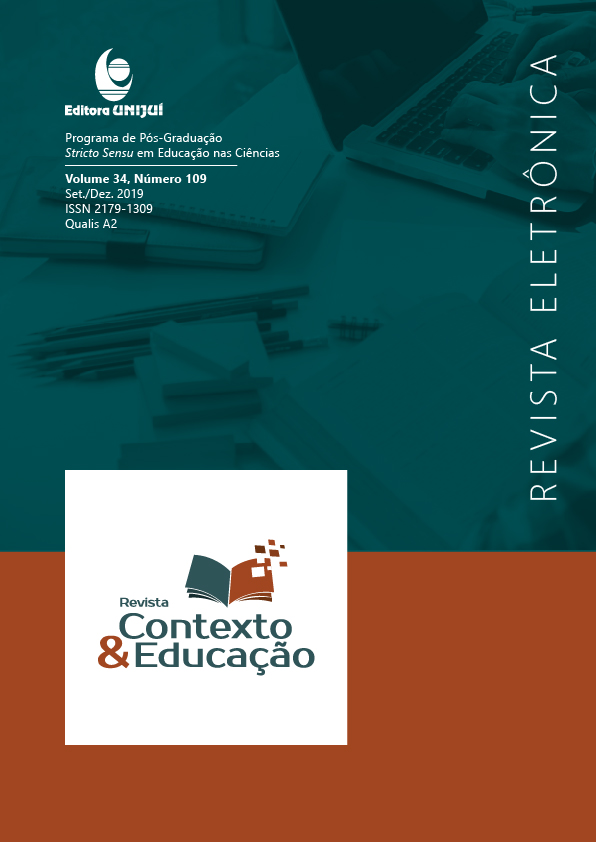TEMAS E CONTEÚDO DO JOGO DE PAPÉIS: SINALIZANDO CAMINHOS PARA A ATUAÇÃO PEDAGÓGICA COM A ATIVIDADE LÚDICA NA EDUCAÇÃO INFANTIL
DOI:
https://doi.org/10.21527/2179-1309.2019.109.121-133Palavras-chave:
Jogo de papéis; Elkonin; desenvolvimento psíquico; Teoria histórico-cultural; educação infantil.Resumo
Para a Teoria Histórico-Cultural, a atividade lúdica é fundamental no desenvolvimento psíquico da criança. Para compreendermos as razões de se considerar essa atividade importante para o desenvolvimento infantil, realizamos uma pesquisa de caráter bibliográfico, na qual centramos nossa análise na produção de Leontiev e Elkonin, autores dessa linha teórica que se ocuparam do estudo do desenvolvimento psíquico e da periodização do desenvolvimento infantil. Elkonin afirma que o jogo de papéis é a atividade lúdica que maior impacto exerce no desenvolvimento de crianças na faixa etária que corresponde ao final da educação infantil. Ele distingue dois elementos no jogo de papéis, o tema e o conteúdo. Por meio da compreensão desses elementos é possível reconhecer que nas instituições educativas, além de se reservar tempo e espaço para esse tipo de atividade lúdica, é preciso atuar pedagogicamente no conteúdo dela. Essa atuação pedagógica sobre o conteúdo do jogo não é o mesmo que dirigir diretamente as ações da criança, privando-a da liberdade de criação, mas significa atuar de modo a propiciar condições para que as crianças ampliem seu universo cultural, favorecendo o acesso ao conhecimento de várias atividades humanas presentes na realidade objetiva, de modo a enriquecer suas possibilidades de imitação, imaginação e criação na brincadeira.
Downloads
Publicado
Como Citar
Edição
Seção
Licença
Ao publicar na Revista Contexto & Educação, os autores concordam com os seguintes termos:
Os trabalhos seguem a licença Creative Commons Atribuição 4.0 Internacional (CC BY 4.0), que permite:
Compartilhar — copiar e redistribuir o material em qualquer meio ou formato;
Adaptar — remixar, transformar e criar a partir do material para qualquer fim, inclusive comercial.
Essas permissões são irrevogáveis, desde que respeitados os seguintes termos:
Atribuição — os autores devem ser devidamente creditados, com link para a licença e indicação de eventuais alterações realizadas.
Sem restrições adicionais — não podem ser aplicadas condições legais ou tecnológicas que restrinjam o uso permitido pela licença.
Avisos:
A licença não se aplica a elementos em domínio público ou cobertos por exceções legais.
A licença não garante todos os direitos necessários para usos específicos (ex.: direitos de imagem, privacidade ou morais).
A revista não se responsabiliza pelas opiniões expressas nos artigos, que são de exclusiva responsabilidade dos autores. O Editor, com o apoio do Comitê Editorial, reserva-se o direito de sugerir ou solicitar modificações quando necessário.
Somente serão aceitos artigos científicos originais, com resultados de pesquisas de interesse que não tenham sido publicados nem submetidos simultaneamente a outro periódico com o mesmo objetivo.
A menção a marcas comerciais ou produtos específicos destina-se apenas à identificação, sem qualquer vínculo promocional por parte dos autores ou da revista.
Contrato de Licença (para artigos publicados a partir de outubro/2025): Os autores mantém os direitos autorais sobre seu artigo, e concedem a Revista Contexto & Educação o direito de primeira publicação.


